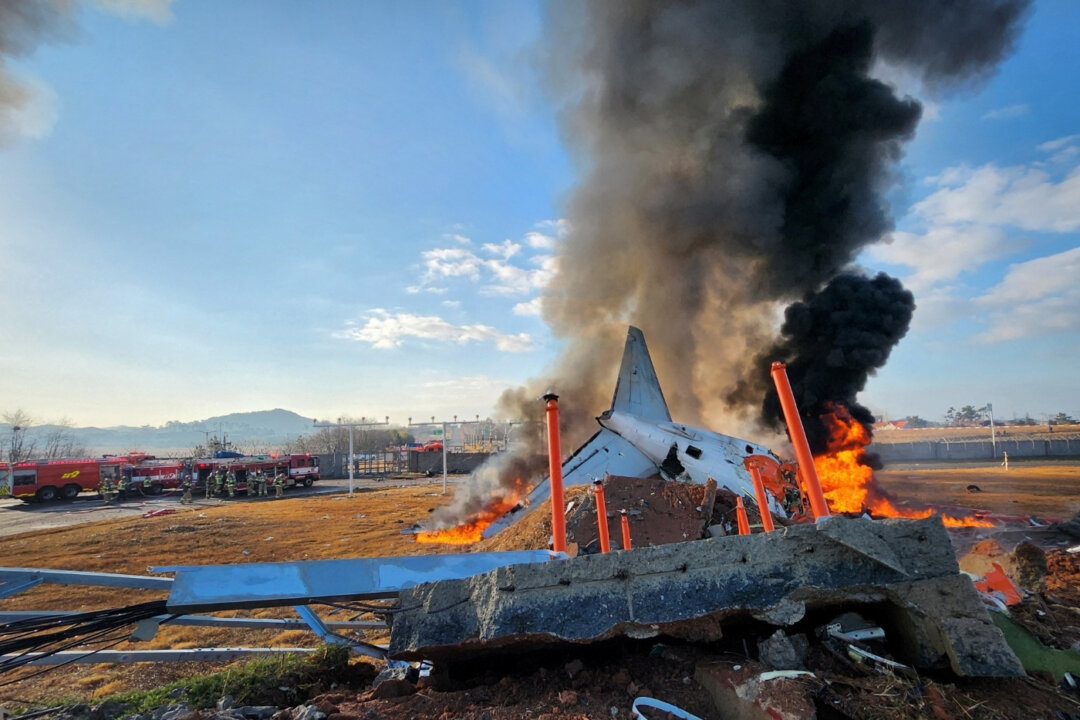The Jeju Air crash killed 179 people in the South Korean city of Muan on Sunday morning.
A bird strike has emerged as a possible factor in a plane crash in Muan, South Korea, that left 179 people dead on Sunday after officials confirmed air traffic controllers warned the plane about bird strike risks just minutes before the plane went down.
South Korea’s transport ministry said that an airport control tower warned of a bird strike about six minutes before the Jeju Air passenger jet carrying 181 people crashed, according to South Korean newswire service Yonhap News.
The South Korean Ministry of Land, Infrastructure, and Transport said that the control tower sent out the bird strike warning at 8:57 a.m. local time. The plane crashed at around 9:03 a.m. local time after the landing gear did not deploy, while the pilot declared mayday at 8:58 a.m. and tried to land at 9 a.m., officials said.
“While attempting to land on runway No. 1, the control tower issued a bird strike warning and the pilot declared mayday shortly after,” the ministry said in a statement to Yonhap.
Jeju Air was arriving from the Thai capital of Bangkok with 175 passengers and six crew on board and was attempting to land shortly after 9 a.m. at the airport in the south of the country, South Korea’s transport ministry also said Sunday.
The two crew members, a man and a woman, were rescued from the tail section of the burning plane, Lee said. They were being treated at hospitals with medium to severe injuries, said the head of the local public health center.
The incident, the deadliest air accident on South Korean soil, was also the worst involving a South Korean airline in nearly three decades, according to the transport ministry.
The twin-engine Boeing 737-800 was seen in local media video skidding down the runway with no visible landing gear before crashing into navigation equipment and a wall in an explosion of flames and debris.
“Only the tail part retains a little bit of shape, and the rest of (the plane) looks almost impossible to recognize,” Muan fire chief Lee Jung-hyun said at a press briefing. Investigators are examining bird strikes and weather conditions as possible factors, Lee also said.
Experts said the bird strike report and the way the aircraft attempted to land raised more questions than answers. “A bird strike is not unusual, problems with an undercarriage are not unusual,” said Airline News editor Geoffrey Thomas. “Bird strikes happen far more often, but typically they don’t cause the loss of an airplane by themselves.”
“At this point there are a lot more questions than we have answers. Why was the plane going so fast? Why were the flaps not open? Why was the landing gear not down?” said Gregory Alegi, an aviation expert and former teacher at Italy’s air force academy.
Muan is located some 200 miles south of the South Korean capital of Seoul, and passengers on the Jeju Airlines plane include two Thai nationals, the Transport Ministry has said. The rest are believed to be South Korean nationals.
“We deeply apologize to all those affected by the incident,” the airline said in a statement. “We will make every effort to resolve the situation. We sincerely regret the distress caused.”
Reuters contributed to this report.

